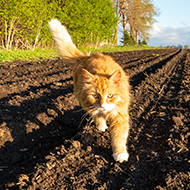RSPCA launches farm cat rehoming campaign

The RSPCA has revealed that it rehomes over 20,000 cats per year.
This International Cat Day (Saturday 8 August), the RSPCA launched its new rehoming campaign, which aims to find outdoor homes for cats with more nervous dispositions, as reported by the RSPCA on its website.
Aiming to find homes for farm cats and outdoor cats, the campaign intends to educate the public on different feline temperaments, highlighting the fact that not every cat is friendly or happy to live inside with people.
In educating people on the needs of farm and outdoor cats, the charity hopes to find homes faster for the cats in its care that require that type of environment.
The campaign follows a recent RSPCA survey, which found that 90 per cent of centres and branches struggled to find suitable homes for farm cats than more sociable cats.
On the 'Rehome a farm cat' page of the RSPCA's website, the charity suggests that a suitable home for a farm cat would include stables, farms, garden centres, nursing homes, and large gardens with shelters.
It also provides clear guidance on what is expected of farm cat owners, including provision of constantly accessible clean water, access to food, provision of a safe, clean, warm, well-maintained and waterproof shelter, and of veterinary treatment where necessary.
RSPCA's cat welfare expert Alice Potter commented: "There are all sorts of reasons why some cats need this type of lifestyle. They may have lived for a long time as a stray and aren't familiar or comfortable being close to people or it may relate to their early experiences or genetics. Whatever the reason, we try to find the perfect home for them.
"We know that our centres and branches often struggle to find homes for our farm or outdoor cats and often one of the reasons cited is that there is a lack of awareness amongst the general public that these cats exist and that they will be much happier living an outdoorsy lifestyle.
"This is why we have launched this rehoming campaign for farm cats on International Cat Day to help raise awareness of the different homes these independent cats need."



 The Veterinary Medicines Directorate (VMD) is inviting applications from veterinary students to attend a one-week extramural studies (EMS) placement in July 2026.
The Veterinary Medicines Directorate (VMD) is inviting applications from veterinary students to attend a one-week extramural studies (EMS) placement in July 2026.